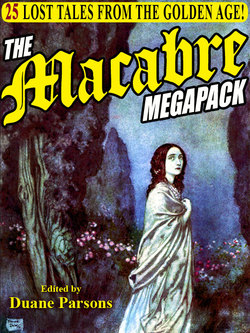Читать книгу The Macabre Megapack - Lafcadio Hearn - Страница 4
На сайте Литреса книга снята с продажи.
ОглавлениеIntroduction
No unseen hand guided me in the preparation of this small collection of stories, for the most part forgotten to literary history; although the spirits of the dead have made many a night full with their eerie tales, I was so shallow as to presume that anything they had to offer was a tale well-known to all, and long since deemed a classic; it was therefore rather a matter of good fortune’s favor that led me to the deserted and generally neglected section of a library cellar where I chanced upon a fine collection of literary annuals from the 1840s. I will be forthright is saying that the greater part of the stories contained therein were indeed justly forgotten, but my attention yet quickly centered on a piece by an author I had never heard of: Henry Fothergill Chorely. It was “The Silent Man.” I was much taken aback to find a story that might have been written by Poe or Hearn buried in such utter obscurity. Poe, in fact, I soon discovered, was an admirer of this now-unknown person and had once favorably reviewed his work. Why then was he so forgotten? The answer to that question was soon provided as a search of other stories by him revealed an author at times brilliant, at other times laughingly bad. He also wrote several novels and they too were of a decidedly uneven quality. Of these I will vouch only for “The Prodigy.”
This led me not to any ready conclusion but rather to a still larger question: have we erred in considering the author as a hero of sorts? I recollected developing such sentiments regarding Ernest Hemingway during my youth, and expending unwarranted time in reading his complete works, many of which were not worthy of my time: “The Torrents of Spring,” “The Green Hills of Africa,” “Across the River and Into the Trees,” and so on. It had thus become evident to me quite early in life that it is a mistake to assume that everything by a Great Author is indeed great literature. Now I was led to a comparable but somewhat different conjecture, a sort of mirror reflection of the first, one might say: if it may said that not everything by a author deemed great is great, then might the reverse not also hold true, and lead us to let fall into obscurity exceptionally fine writing, simply because the author only rarely—perhaps even only once—touched true greatness? What would happen if I reconfigured my favorite genre of literature—the macabre tales of the early 19th century—in terms of the writing, and not the writer? Was this single masterful tale by an otherwise mediocre writer really all that unique? Macabre had been a thriving genre for more than forty years; most of it consisted of short stories, of which the bulk that survives in our esteem is assigned to a mere handful of authors. What else was there, other than the stories of Poe, Hawthorne and a few others? What writers did they know, work with, and often admire?
I soon found myself poring through volume after volume of American and British literary journals of the period, and after two fruitful and fascinating years found I had amassed five full boxes of stories I felt worthy of being unearthed from this literary graveyard. The mass of material came to almost five hundred in number. It was indeed like robbing graves, to plunder these rich fields of forgotten genius. What follows is but a small selection of representative works, many by personal friends of Poe, and in a few cases by personal enemies. Some of the best pieces however were by authors for whom the tale included here was their only known foray into the macabre.
There is therefore a great variety to this selection, and it may be that the variety of style and subject is perhaps at times overwhelming, and that a multi-volume work is more in order than that which follows. And perhaps this is so; but such a consideration is dependent on how well this preliminary piece of literary archeology—grave-robbing, if you must!—is received. I conclude by casting a nocturnal glance about me, sensing in the shrouded corners a multiplicity of persons—a gathering of souls long gone from this particular level of human reality—all of whom now turn to me as their last hope for rescue from literary oblivion. I am honored to be their representative, in both deed and sentiment. If ever I should betroth a ghost it would surely be the elegant Emma Embury; and as to my old friend Mr. Chorely, he is always welcome as a guest in my home. As for the rest, time and space demand that I must bestow on them a collective expression of gratitude for their posthumous participation in this small endeavour of mine. I will simply bid them all a brief rest from these labors; and beg the reader’s indulgence if I must speak for them all and say: enjoy these tales, and remember the hands that wrote them.
—Duane Parsons
